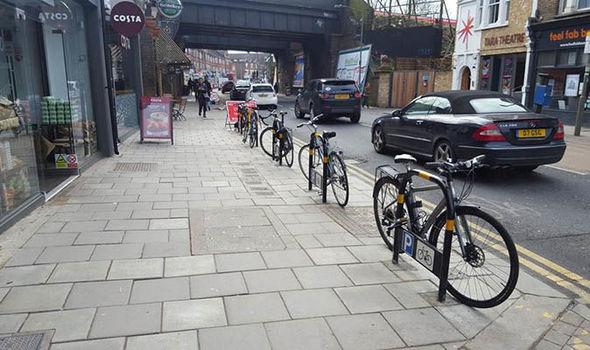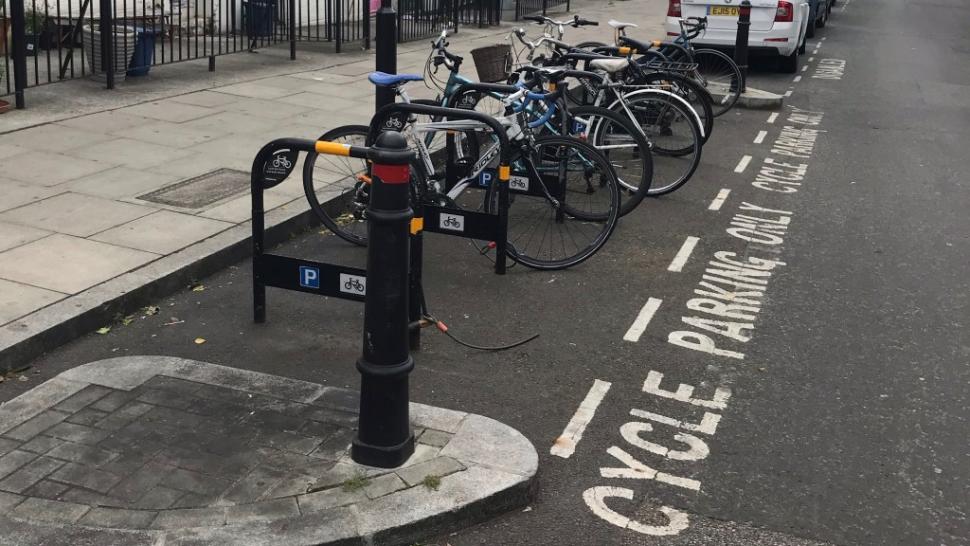- News
- Reviews
- Bikes
- Accessories
- Accessories - misc
- Computer mounts
- Bags
- Bar ends
- Bike bags & cases
- Bottle cages
- Bottles
- Cameras
- Car racks
- Child seats
- Computers
- Glasses
- GPS units
- Helmets
- Lights - front
- Lights - rear
- Lights - sets
- Locks
- Mirrors
- Mudguards
- Racks
- Pumps & CO2 inflators
- Puncture kits
- Reflectives
- Smart watches
- Stands and racks
- Trailers
- Clothing
- Components
- Bar tape & grips
- Bottom brackets
- Brake & gear cables
- Brake & STI levers
- Brake pads & spares
- Brakes
- Cassettes & freewheels
- Chains
- Chainsets & chainrings
- Derailleurs - front
- Derailleurs - rear
- Forks
- Gear levers & shifters
- Groupsets
- Handlebars & extensions
- Headsets
- Hubs
- Inner tubes
- Pedals
- Quick releases & skewers
- Saddles
- Seatposts
- Stems
- Wheels
- Tyres
- Health, fitness and nutrition
- Tools and workshop
- Miscellaneous
- Cross country mountain bikes
- Tubeless valves
- Buyers Guides
- Features
- Forum
- Recommends
- Podcast
 Pavement-parking-solution-Wandsworth-London-UK
Pavement-parking-solution-Wandsworth-London-UKHow to stop pavement parking? “Install bike racks”, say active travel campaigners
A local active travel group in Cambridge is arguing that installing cycle racks on the pavement would have the effect of solving two problems at once: stopping drivers from parking on the pavement and providing “much-needed” additional space for cyclists to park bikes.
Mill Road 4 People is a group of more than 900 local residents and traders based in the busy Cambridge street, aiming to make it an “attractive, safe and successful street”, with a focus on making it safer and more accessible, reducing traffic, and improving public transport as well as cycling and walking conditions.
One of the primary campaigns of the group has been against pavement and illegal parking along the road. It has called for stricter enforcement of parking regulations and better awareness amongst drivers for the last three years. The group is now saying that bike racks could be installed on wider sections of the pavement in order to block people from driving up onto the path.
At a meeting of the Greater Cambridge Partnership’s (GCP) joint assembly earlier this week, Tina Riches from the Mill Road 4 People asked whether the GCP would consider funding bike racks to stop people from driving up onto the pavement to park, reports Cambridgeshire Live.
She said: “Mill Road 4 People has been conducting a hugely popular campaign called 'PaveMeant for People', aimed at tackling illegal pavement parking. We are calling for individual bike racks to be installed at the pavement edge, parallel to the road, in all places where the pavement width is sufficient.
“This would both create a barrier to pavement parking and provide much-needed extra bike parking. Could you confirm that at least one of your ‘demonstrator projects’ will be aimed at tackling pavement parking on Mill Road, and that our proposal will be given serious consideration?”
> Worst bike racks — from the useless to utterly unusable places to park your bicycle
Peter Blake, the transport director at the GCP, said this could be something that was considered in the future.
He said: “Cambridgeshire County Council is the lead agency on the Mill Road project. At the moment it is clearly going through a legal process, following the outcome of that legal process we will be happy to continue our dialogue with county colleagues on what happens next. Clearly if the assembly and the board support the idea of some sort of quick win list then that could be added to those considerations.”
Can bike racks stop pavement parking?
Mill Road 4 People is not the first organisation to come up with this strategy to deal with the issue.
Back in 2018, Wandsworth Council implemented the idea by installing a number of bike racks near Earlsfield Station just over a foot from the road, not only preventing delivery lorry drivers from parking on the pavement but also encouraging more cycling.
In fact, the UK Government states bike racks as one of the “engineering measures”, along with other physical objects such as railings, plant pots “to stop people parking on pavements”.
The Government’s 1993 traffic advisory leaflet on pavement parking also encourages the use of engineering measures to stop pavement parking. However, it adds that these objects may add to street clutter and recommends local authorities to judge whether any such measure would create a physical barrier for those with visual or mobility impairments.
On the other hand, there have been a few cases where people haven’t taken to the idea very well. In 2018, a tattoo parlour owner in Portsmouth vowed to keep parking on the pavement outside his shop, despite the council installing bicycle racks along the path to deter parking
He said that his family was left feeling “victimised” after being handed a parking ticket, despite regularly using their forecourt as a car space for four years.
Meanwhile, Mill Road 4 People in Cambridge has argued that pavement parking is one of the biggest issues the street is facing in the city. However, GCP has previously been known to take a rather lenient approach towards motorists driving over the kerb to park their cars.
> Mayor backs bus gate being reinstated on bridge on Cambridge’s busy Mill Road
In 2017, the delivery body for Cambridge's City Deal said that cars should be permitted to park in a kerb-segregated cycle lane on Green End Road to help people access local businesses, much to the dismay of many cycling campaigners.
Cambridge’s cycling advocacy group Camcycle claimed that allowing parking in the cycle lane undermines the entire scheme. A spokesperson for the group said: “The GCP must do better for the large number of people who cycle on Green End Road. Winding in and out of cycle lanes on busy roads is also unsafe, so many people cycling will make the logical decision to avoid the cycle lane entirely and to hold a safe and primary position in the lane as encouraged by the Highway Code.”
Adwitiya joined road.cc in 2023 as a news writer after completing his masters in journalism from Cardiff University. His dissertation focused on active travel, which soon threw him into the deep end of covering everything related to the two-wheeled tool, and now cycling is as big a part of his life as guitars and football. He has previously covered local and national politics for Voice Cymru, and also likes to write about science, tech and the environment, if he can find the time. Living right next to the Taff trail in the Welsh capital, you can find him trying to tackle the brutal climbs in the valleys.
Latest Comments
- NE2Wheels 8 min 28 sec ago
It isn't. I was responding to someone who is considering getting back on a bicycle but is nervous about it.
- holtyboy 12 min 35 sec ago
I missed this, because I also deleted my account with the greedy money grabbing tools that they are.
- Rendel Harris 18 min 21 sec ago
No no, with dear old Flinty it was always "LAYBAH"
- matthewn5 1 hour 26 min ago
Ellis Briggs do a proper job. https://www.ellisbriggscycles.co.uk/resprays/
- matthewn5 1 hour 49 min ago
The ugliness is the dealbreaker for me.
- Simon E 2 hours 7 min ago
I'd put in a nomination for the Cateye Viz range....
- Generally speaking 2 hours 7 min ago
It's true I cycle everyday but I've never contributed anything to Maidenhead, admittedly it's 113 miles away and a bit out of my way just to nip to...
- chrisonabike 3 hours 4 min ago
I think mdavidford had the most likely view on (2) - on (1) I guess we'll find out if anyone wants to donate to the lawyers and actually try to see...
- eburtthebike 7 hours 6 min ago
I well remember the BBC rolling out their environment correspondent to criticise LTNs.
- Terry Hutt 13 hours 16 min ago
Those models aren't miserable etc. They're hungry.

Add new comment
12 comments
Why not just enforce the existing law? Rule 145 highway code, You MUST NOT drive on or over a pavement, footway or bridleway except to gain lawful access to a property or in an emergency.
Because it only applies to driving on the pavement, not parking on it, and the driving has to be witnessed by a police officer.
It's basically a b/s law isn't it? If a motor vehicle is on a pavement, how do you think it got there? Did someone pick it up and put it there?
Yup, that's exactly what lawyers are "for". The prosecution says I drove it there, my guy says "but it's up to you to prove that! Can you prove that it wasn't put there by a pack of passing rugby forwards, a crane or other means unknown? If you insist you can your next task is to prove that it was my client driving."
I think precedent says that the CPS just don't bother.
Of course the way round that is sort the law out (Scotland sort of has ... implementation is just starting and it's patchy). Obviously that will give the lawyers another crack at some creative arguments - but that's for the next round.
the driving has to be witnessed by a police officer
Another common police dodge which they have just made up- it didn't apply when Rishi Sunak was fined for filming a campaign video in a car, while in a moving car. They use it when vehicles are filmed without MOT by interfering busybody private citizens, until they realise that everybody knows they're lying. Then they just refuse to respond to any photographic submissions at all, as they don't like leaving evidence of their lies in writing
Not directly comparable though are they. Video of the PM not wearing a seatbelt is evidence of an offence. Seeing a car stationary on a pavement is not. Though I'm not kidding myself that they would act on video of drivers driving on the pavement.
Depends on what you believe is evidence. Lancashire Constabulary does not believe anything is evidence
From St Albans Cycle Campaign today
Personally I'd like a bollard on the kerb to protect my parked bike from incompetent drivers. Have seen many roadside racks (and bikes attached to them ) driven into.
Exactly. I'm already expected to play the role of "human traffic calming" on the roads, why should I have to sacrifice my frame for those on the pavement because people can't drive properly?
Fortunately in the UK other drivers have taken it upon themselves to set up a protective barrier with their parked cars though... 😈
Seconded: If I'm parking at one of those ranks of chevroned Sheffield stands, I'll always try and park in the middle rather than at the end facing the traffic... The end one is often the one that is leaning at a "hit by a car" angle.
Bloody cyclists, build them a perfectly good cycle stand and they just trash it... (also railings next to roads, traffic lights, signs, railway bridges...)